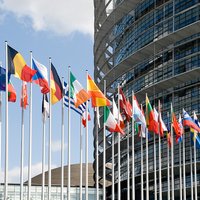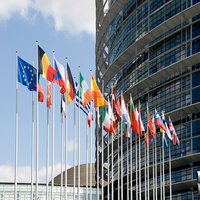Without the USA, the Rest of the World Must Cooperate More Closely than Ever
First appraisal from the Wuppertal Institute on the US exit from the Paris Agreement

First appraisal from the Wuppertal Institute on the US exit from the Paris Agreement

The US exit from the Paris Agreement is a burden but does not spell the end of international climate policy. The paradigm shift heralded by the Paris Agreement is not something Trump can reverse. In the end, the USA itself could stand to lose most. The deciding factor for the international negotiations is now the response from the global community. Germany plays a key role here as host to the G20 Summit. In the medium term, closing ranks with ambitious US states such as California could limit the damage.
By exiting from the Paris Agreement, the US government has isolated itself internationally
The deciding factor for the future of international climate policy will now be the response from the global community. "The signals here so far are positive," said Prof. Dr. Manfred Fischedick, Vice President of the Wuppertal Institute. "Up to now, it looks like the US government is alone in the world in failing to see the signs of the times. The reactions from the EU, China and many other countries give grounds for hope that there will not be a domino effect with other countries following the US example."
These responses show that the Paris Agreement marks a paradigm shift. "The rest of the world no longer sees climate action as a burden but as an opportunity to attain a whole array of other policy goals. This is also brought out by moves to strengthen the links between international climate policy and the United Nations sustainability goals. Climate action is industrial policy, policy for clean air in smog-bound cities. It is also development policy, for example in supplying rural populations with electric power from renewable energy," said Lukas Hermwille, research fellow for international climate policy at the Wuppertal Institute.
The G20 Summit may prove the acid test for international climate policy. Germany has a key role here as host to the Summit. In the run-up to the G20 talks, Germany has consistently underscored that climate policy will be among its central issues. For the future of the international climate regime, it is crucial for it to stay that way – even if it means falling out with the USA. "If Germany were to back down and take the issue off the agenda, that would be a disastrous sign for international climate policy," Hermwille said.
"In the end, the USA could stand to lose most."
The biggest harm caused by US withdrawal is to the USA itself. But it also indirectly harms the entire global community, because the USA could have remained a strong partner able to make a major contribution to the global challenge of decarbonisation. The self-inflicted harm to the USA is that it risks squandering a good starting position in renewables where it has so far been among the technology leaders. As Wolfgang Obergassel, Project Co-ordinator of Research Group Energy, Transport and Climate Policy, explains: "That is not only very short-sighted in industry policy terms, but also in terms of employment: The US solar sector already provides more than twice as many jobs as the coal industry. So in the end, the USA could stand to lose most."
Besides, even Trump cannot halt the decline of the US coal industry. Coal is no longer competitive against cheaper natural gas and renewable energy sources. The trend towards dramatically falling prices for wind and solar power and in storage technologies is not something that Trump can reverse. That trend is now driven most of all by demand from emerging economies. Without the USA, however, the global energy transformation could take longer.
Closing ranks with still ambitious US states such as California could limit the damage
Because of the withdrawal mechanism, the exit from the Paris Agreement will not be completed until four years' time – shortly after the next Presidential election. Until then, the USA still has a place at the negotiating table. But it remains to be seen during the next round of climate negotiations whether the USA uses that place to sabotage the negotiations from within or chooses largely to ignore the process and to be ignored by the rest of the world in return.
"To minimise the harm to the climate, Germany and the EU should now aim to work far more closely with proactive stakeholders, say at the level of the US states," said Prof. Dr. Hermann E. Ott, Senior Advisor for Global Sustainability and Welfare Strategies at the Wuppertal Institute. Moves to involve non-governmental and sub-national stakeholders in UN climate negotiations have already been underway for some years. These efforts now need to be stepped up. In addition, it may make sense for the UN process to build alliances with ambitious countries, and also with US states such as California. "A club of this kind would have the benefit of not depending on the consensus principle, giving it protection from sabotage attempts from the US government," Ott explained.
The Wuppertal Institute has followed and evaluated the outcomes of international climate negotiations for over 20 years and researches into ways of implementing climate action at national and global level.
Press release of the Wuppertal Institute for Climate, Environment and Energy
Legally responsible for content: Prof. Dr. Uwe Schneidewind, President
Contact: Luisa Lucas, Public Relations
Phone: +49 202 2492-292, Fax: +49 202 2492-108
E-mail: luisa.lucas@wupperinst.org
